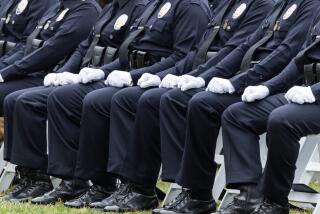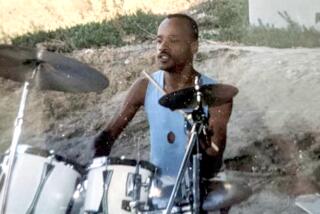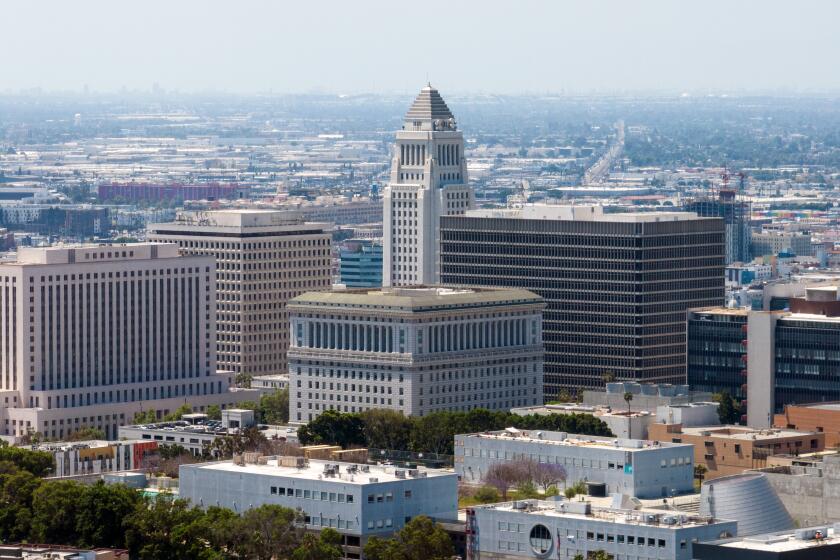Golden State Killer suspect must provide new DNA samples and fingerprints, judge rules
Reporting from Sacramento — A Sacramento County judge on Thursday ruled that the Golden State Killer suspect cannot refuse to provide additional DNA samples, fingerprints and photographs of his body sought by authorities as part of their investigation.
In the ruling, the judge agreed with prosecutors who argued that the evidence authorities sought was part of a search warrant already approved by a judge and did not amount to self-incrimination.
Joseph James DeAngelo, 72, is suspected of raping at least 46 women and killing at least a dozen people. He was arrested at his home in the Sacramento suburbs in April 24, just days after DNA samples surreptitiously gathered from him by law enforcement linked him to crimes attributed to the Golden State Killer and East Area Rapist.
DeAngelo’s attorney filed a motion earlier this week seeking to prevent sheriff’s investigators from taking additional DNA samples and fingerprints and photographing his body, including his genitals.
“The government seeks to execute a warrant issued before the defendant’s arrest and arraignment,” defense attorney Diane Howard argued in the filing. “But the government’s right to unfettered investigation is substantially curtailed by constitutional concerns which attend the right to a fair trial and a right to counsel.”
For more than 40 years, law enforcement agencies up and down California had hunted for the man who terrorized the East Bay, the Sacramento area and Southern California in the ’70s and ’80s.
Sacramento County investigators announced DeAngelo’s arrest last week and said that not only did his DNA match evidence found at some of the killings, but his known whereabouts also coincided with the timeline of the killings.
Prosecutors argued that obtaining additional DNA, fingerprints and photographs were just a continuation of a search warrant a judge signed April 24, and that by providing them DeAngelo would not be incriminating himself — which he could lawfully refuse to do under the Constitution.
“In the present case, obtaining the defendant’s major case prints and his DNA sample does not require him to speak or say even a word,” prosecutors wrote. “Likewise, taking photographs of his person does not require the defendant to share his thoughts and beliefs with law enforcement.”
Public defenders had argued that now that DeAngelo is charged with murder, police must go through the court and follow discovery rules to collect such evidence.
Judge Michael Sweet however ruled that what investigators seek, though more extensive, is akin to the fingerprints and swabs collected from anyone booked on a serious felony charge. The collection of such evidence was approved before DeAngelo’s arrest in a search warrant signed by a magistrate.
That search warrant is among documents that remain sealed in the case. The Times and other news organizations have filed a motion to have the search warrant unsealed. Sweet will consider that motion on May 14, the next time D’Angelo is due to appear in court.
Thus far, authorities have been tight-lipped on what evidence they have that connects DeAngelo to the killings other than his DNA.
Over the years, the Golden State Killer was variously known in different parts of the state as the Original Night Stalker, the East Area Rapist and the Visalia Ransacker.
His known crimes started with violent burglaries in Visalia that graduated to rapes around Sacramento County and then rapes and killings by the time he popped up on the radar of Southern California law enforcement at the end of 1979.
Not until DNA technology advanced two decades later did authorities conclude that all the crimes were committed by the same persont.
And it wasn’t until an investigator took a novel — and to some controversial — approach in submitting the killer’s DNA to a public genealogy database that investigators knew where to start looking.
The familial trail led to DeAngelo, officials say. Detectives then gathered two separate DNA samples from DeAngelo that they said matched evidence collected at crime scenes and took him into custody.
At Thursday’s hearing, DeAngelo was again shackled to a wheelchair and rolled into the courtroom. He did not speak to the judge but exchanged words with public defender Diane Howard, who often put a hand on his shoulder. DeAngelo had appeared sluggish at his arraignment last week, but more alert on Thursday.
St. John reported from Sacramento and Serna from Los Angeles.
For breaking California news, follow @JosephSerna on Twitter.
More to Read
Sign up for Essential California
The most important California stories and recommendations in your inbox every morning.
You may occasionally receive promotional content from the Los Angeles Times.












